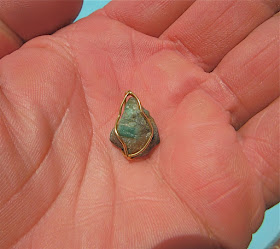A couple of weeks ago my wife lost one of her favorite emerald ear rings, she was gutted until yesterday when I spotted the gold and green ear ring on the edge of the driveway.
It was the second piece of gold I have picked up off the ground this week, I guess you could say looking at the ground Im walking over is a work related habit.
Many beach hunters now use metal detectors with VDI screens and get into the bad habit of being obsessed with target ID numbers and looking at the screen instead of the ground.
I now see people searching beaches intently looking at metal detector screens instead of the ground around them.
Believe me, there are way too many distractions at south Florida beaches to keep your eyes only on a detector screen lol
Beach treasure hunting should always be about looking for good stuff as well as trying to detect good stuff.
Your metal detector is a tool you use to help you detect unseen metal objects, but it’s not the main detection tool.
Never under estimate the importance of your “ Twin optical scanners”, an important thing to remember if your just starting out metal detecting.
A metal detector screen will not help you read the beach or tell you where the most promising looking area at the site is, it is just an aid to identifying metal objects.
I often use metal detectors that have multiple ways of identifying targets after they are detected, but I rely on my baby blues to get me to the decision time.
Here are a few examples of things I have pulled out of mud and sand after only seeing an inch or two green, black or white.





